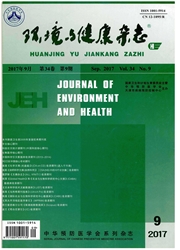

 中文摘要:
中文摘要:
目的研究T-2毒素对软骨细胞P53、Bcl-xL和Caspase-3表达的影响以及硒对T-2毒素致软骨细胞损伤的保护作用。方法胎儿软骨细胞体外培养5d,向培养液中加入硒(100μg/L)和不同浓度的T-2毒素(1、10、20μg/L),采用Western blot分析软骨细胞P53、Bcl-xL和Caspase-3蛋白表达水平;用RT-PCR法检测软骨细胞P53、Bcl-xL和Caspase-3 mRNA的表达。结果各T-2毒素组与对照组比较,不同浓度的T-2毒素(1-20μg/L)均能引起P53蛋白表达水平明显升高和Bcl-xL蛋白表达水平下降(P〈0.05);当T-2毒素浓度达10-20μg/L时,Caspase-3蛋白和mRNA表达水平均升高(P〈0.05);当T-2毒素浓度达20μg/L时,P53的mRNA表达水平明显升高(P〈0.05)。各T-2毒素组与T-2毒素加硒组比较,硒可部分对抗T-2毒素引起的P53表达的升高和Bcl-xL表达的下降,同时,降低Caspase-3表达水平(P〈0.05)。结论T-2毒素诱导的凋亡与其上调软骨细胞P53、Caspase-3表达,同时下调Bcl-xL表达水平有关;硒可部分对抗P53、Caspase-3和Bcl-xL表达的变化,对软骨细胞有保护作用。
 英文摘要:
英文摘要:
Objective To determine the effect of T-2 toxin and selenium on the protein expression of P53, Bcl-xL and Caspase-3 in chondrocytes,and to known the molecular targets and mechanisms of T-2 toxin induced apoptosis,the protective effects of selenium in the T-2 toxin induced apoptosis. Methods The human chondrocytes were treated with T-2 toxin (1-20 μg/L) and selenium (100μg/L) for 5 days. The protein expression of P53, Bcl-xL and Caspase-3 were determined by Western blot analysis and their mRNA expression were determined by RT-PCR. Results An increase in P53 and a decrease in expression of the antiapoptotic factor Bcl-xL were observed in a dose-dependent manner after exposure of 1-20μg/L T-2 toxin, while the expression of the Bcl-xL mRNA was unchanged. Meanwhile, T-2 toxin could also up-regulate the expression of both pro-caspase-3 and easpase-3 in a dose-dependent manner. Selenium down regulated P53 and Caspase-3 expression and up regulated Bcl-xL expression induced by T-2 toxin. Conclusion These data suggest a possible underlying molecular mechanism whereby T-2 toxin could induce the apoptosis signaling pathway in human chondrocytes by the regulation of apoptosis-related proteins P53,Bcl-xL and Caspase-3. Selenium has a protective effect by partly blocking the increased expression of P53 and Caspase-3, as well as decreased expression of Bcl-xL induced by T-2 toxin.
 同期刊论文项目
同期刊论文项目
 同项目期刊论文
同项目期刊论文
 Different challenge terms determine disease patterns of antigen-induced pulmonary inflammation in E3
Different challenge terms determine disease patterns of antigen-induced pulmonary inflammation in E3 Detection of serum proteomic changes and discovery of serum biomarkers for Kashin-Beck Disease using
Detection of serum proteomic changes and discovery of serum biomarkers for Kashin-Beck Disease using Kashin-Beck disease and Sayiwak disease in China: Prevalence and a comparison of the clinical manife
Kashin-Beck disease and Sayiwak disease in China: Prevalence and a comparison of the clinical manife Measuring health-related quality of life in Kashin-Beck disease using EQ-5D. Qual Life Res. 2011;20(
Measuring health-related quality of life in Kashin-Beck disease using EQ-5D. Qual Life Res. 2011;20( Heritability estimates and linkage analysis of 23 short tandem repeat loci on chromosomes 2, 11, and
Heritability estimates and linkage analysis of 23 short tandem repeat loci on chromosomes 2, 11, and Suppressive effects of black seed oil on ovalbumin induced acute lung remodeling in E3 rats. Swiss M
Suppressive effects of black seed oil on ovalbumin induced acute lung remodeling in E3 rats. Swiss M Main source of drinking water and familial aggregation of Kashin-Beck disease: a population based on
Main source of drinking water and familial aggregation of Kashin-Beck disease: a population based on Oxidant Damage in Kashin-Beck disease and a rat Kashin-Beck disease model by employing T-2 toxin tre
Oxidant Damage in Kashin-Beck disease and a rat Kashin-Beck disease model by employing T-2 toxin tre Mitochondrial function is altered in articular chondrocytes of an endemic osteoarthritis, KashineBec
Mitochondrial function is altered in articular chondrocytes of an endemic osteoarthritis, KashineBec Genome-Wide Gene Expression Analysis Suggests an Important Role of Hypoxia in the Pathogenesis of En
Genome-Wide Gene Expression Analysis Suggests an Important Role of Hypoxia in the Pathogenesis of En Histopathology of Chondronecrosis development in knee articular cartilage in a rat model of Kashin-B
Histopathology of Chondronecrosis development in knee articular cartilage in a rat model of Kashin-B Correlation analysis between bone mineral density and serum element contents of postmenopausal women
Correlation analysis between bone mineral density and serum element contents of postmenopausal women The Relationship between Endothelial Nitric Oxide Synthase Gene Polymorphisms and Osteoporosis in Ch
The Relationship between Endothelial Nitric Oxide Synthase Gene Polymorphisms and Osteoporosis in Ch Morphology and phenotype expression of types I, II, III, and X collagen and MMP-13 of chondrocytes c
Morphology and phenotype expression of types I, II, III, and X collagen and MMP-13 of chondrocytes c Proteomic changes in articular cartilage of human endemic osteoarthritis in China. Proteomics. 2011.
Proteomic changes in articular cartilage of human endemic osteoarthritis in China. Proteomics. 2011. A Modified Method using TRIzol((R)) Reagent and Liquid Nitrogen Produces High-Quality RNA from Rat P
A Modified Method using TRIzol((R)) Reagent and Liquid Nitrogen Produces High-Quality RNA from Rat P Comparative analysis of gene expression profiles between primary knee osteoarthritis and an osteoart
Comparative analysis of gene expression profiles between primary knee osteoarthritis and an osteoart T-2 toxin induced apoptosis involving NO, P53, Bcl-xL, Bcl-2, Bax and Caspase-3 signaling pathway in
T-2 toxin induced apoptosis involving NO, P53, Bcl-xL, Bcl-2, Bax and Caspase-3 signaling pathway in Analysis of correlation between blood biochemical indicators and bone mineral density of post-menopa
Analysis of correlation between blood biochemical indicators and bone mineral density of post-menopa High Expression of Liver Histone Deacetylase 3 Deteriorates High-fat-diet-induced Metabolic Syndrome
High Expression of Liver Histone Deacetylase 3 Deteriorates High-fat-diet-induced Metabolic Syndrome The effect of short tandem repeat loci and low selenium levels on endemic osteoarthritis in China. J
The effect of short tandem repeat loci and low selenium levels on endemic osteoarthritis in China. J A systematic comparison between collagen-induced arthritis and pristane-induced arthritis in Dark Ag
A systematic comparison between collagen-induced arthritis and pristane-induced arthritis in Dark Ag Nitric oxide both in bronchoalveolar lavage fluid and serum is assocaited with pathogenesis and seve
Nitric oxide both in bronchoalveolar lavage fluid and serum is assocaited with pathogenesis and seve Downregulated HS6ST2 in osteoarthritis and Kashin–Beck disease inhibits cell viability and influence
Downregulated HS6ST2 in osteoarthritis and Kashin–Beck disease inhibits cell viability and influence 期刊信息
期刊信息
